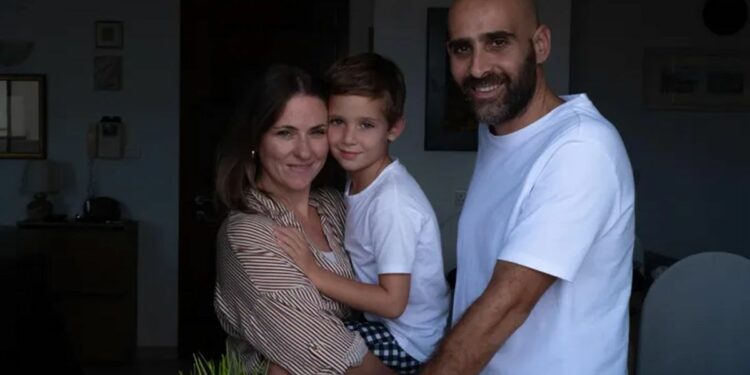Reflecting on her memories, Jade Bruno never
wanted children. But in her 30s, she decided to please her husband Karl, who
loves big families. Eventually, they had a son, Olivier, who will soon be five.
“He’s asleep,” Karl said, joining us on the spacious terrace of their
apartment. Jade is firm: Olivier will be their first and last child. She said she doesn’t have the energy to “go through pregnancy and postpartum depression
again,” not to mention the cost of private school, nearly €500 ($539) per month.
Their building stands on the concrete hills of
In-Naxxar, a town in northern Malta. The family moved into one of the new
apartments sprouting up where old villas once stood—a 70-square-meter,
three-room unit with lacquered furniture valued at €400,000 ($431,938), designed
for middle-upper-class working parents with one child. This is the standard
family model in Malta, a former British colony with Europe’s lowest fertility
rate, with just over one child per woman (1.08).
Like Jade, 77% of Maltese mothers say they do not
want a second child, according to a Family Ministry study conducted in January.
“Raising kids on the island isn’t easy,” the couple explained. Parks are scarce
and barely shaded, beaches are overcrowded and too hot in summer, and streets
are clogged with cars. Open spaces have disappeared amidst Malta’s construction
boom over the past decade. “I don’t recognize the neighborhood where I grew
up,” Jade said. “I’d never let my son roam the streets alone. I don’t feel
safe. Everything’s changed too fast here.”
Since joining the European Union in 2004, Malta
has undergone profound societal, economic, and demographic shifts. The number
of foreign workers from Europe, India, and the Philippines surged from 20,000
in 2012 to 111,000 in 2023, increasing the island’s population by 25%. Indian
bus drivers, Bangladeshi and Serbian construction workers, and Filipino
caregivers fill jobs vacated by an aging population, boosting the economy and
enriching the middle class. However, the flipside is sky-high housing prices, comparable
to Paris, and the weight of Europe’s highest population density. “Maltese
people are becoming claustrophobic,” observed Father Clinton Farrugia, head of
the well-regarded Saint Paul’s Missionary College. The priest has long noted
the church’s waning influence: “I married 20 couples this year. Most hadn’t
seen a priest in a long time. Families still baptize their children, but how
many will go on to confirmation?”
“Maltese people
fear these drastic changes”
Among his parishioners, the cost of living
affects couples’ motivation to have children. “They’ve achieved a comfortable
lifestyle they want to maintain,” the priest added. He also mentioned shrinking
housing sizes, which are unsuitable for large families. Many of his childhood friends are
even considering leaving the country. “Maltese people fear the drastic changes
they’ve experienced,” said Valerie Visanich, a sociologist at the University of
Malta. “Thirty years ago, young women started families without question. Today,
they’re reconsidering the point of it.”
On the archipelago, anxiety about the future
curbs the desire for parenthood. Married for five years, Julienne, 34, sees
this firsthand while talking in a chic café in Valletta. “I had a romanticized
view of family. But the world is so horrible. Having a child feels
irresponsible, like throwing them into a fire.” She gestured with her hands,
mimicking a compressed balloon. “We’re too cramped here. Everything’s a
struggle.” The conversation is interrupted by pro-abortion slogans shouted by
protesters in the square.
On an island where 90% of the population
identifies as Catholic, abortion has become less of a taboo since a law went
into effect allowing it when the mother’s life is at risk and the fetus is
non-viable. Activists calling for broader rights no longer fear gathering in
Valletta’s center. Activist Dawn Sammut, 26, attends every rally and is also
part of the No Kids movement. “A child is stress for life,” said the engineer.
“I don’t have the patience for it. I love my career and want to explore the
world.”
Many couples in Malta speak of wanting to leave.
“We’re asked to have children, but the priority should be to help people who
can’t afford housing,” said Matthias Azzopardi, a former student organization
leader who just earned his law degree. He and his girlfriend live with their
parents, who are unable to afford their own place. Homeownership has become a battle
on an island where even a basic apartment costs at least €250,000 ($269,697).
“Society remains
very patriarchal”
At the ministry, officials counter with positive
stats in response to young people’s frustrations. “I’d like to remind you that
81% of Maltese people are homeowners, which isn’t the case in your country,”
emphasized Family Minister Michael Falzon, citing state-supported home-buying
assistance for new owners and a free childcare program. He attributed low
fertility rates to the “new lifestyle” of women pursuing careers and couples marrying later.
However, studies elsewhere in Europe suggested that
women’s workforce participation doesn’t necessarily lead to lower birth rates.
“The issue lies more in the unequal distribution of tasks within couples, which
remains deeply entrenched in Maltese society,” said academic Anna Borg, leafing
through the latest study from the National Commission for the Promotion of
Equality. “Many mothers feel guilty about working,” noted Francesca Conti,
manager of a closed discussion forum with 53,000 women.
The desire for motherhood hasn’t vanished on the
island, not by any means. Surveys show that the ideal family for Maltese women consists
of two parents and at least two children. Francesca Conti, who married a man
supportive of her work after a failed first marriage, is certain: “When a woman
has an equal partnership with her husband, she feels more confident about
having a second child.”
Source link : https://international.la-croix.com/family/malta-faces-new-reality-as-families-embrace-the-one-child-trend
Author :
Publish date : 2024-10-28 11:44:00
Copyright for syndicated content belongs to the linked Source.


